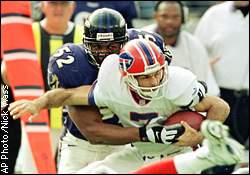| | I couldn't say about Ray Lewis. I couldn't say, certainly, whether this Pro Bowl football player of the Baltimore Ravens is capable either of murdering someone or of counseling a murder or of instigating a killing or of watching a killing happen. And most people who are being honest about what they know and don't know would probably acknowledge that, really, they couldn't say, either.
|  | | Ray Lewis, shown tackling Bills QB Doug Flutie, said he messes up in football "because I'm overaggressive at times." |
But I can say I wouldn't be surprised.
I couldn't say about Rae Carruth, whether the Carolina Panthers receiver
really could have masterminded a plot to have his pregnant girlfriend gunned
down by shooters in a passing car. Rae Carruth, until the time he was
accused of being involved in Cherica Adams' murder and the serious wounding
of her unborn son, was a basically quiet athlete having a basically quiet NFL
career. About murderous impulse, I certainly couldn't say.
But I can say I wouldn't be surprised.
Sports is about nothing if not cumulative effect. Records are compiled
over weeks, months, seasons, years; their impact on the psyche often is the
kind of thing that arrives gradually and then suddenly. History tends to
accrue in sports, not unlike any other long-term investment.
And so, too, accrues the balance of perception. The raw truth is that,
in this new century, there isn't much left an athlete can do that will
surprise us, and that takes in both the darkness and the light. It's as
though sports fans already have seen every extreme covered, for good and for
ill.
And we're running out of shock waves. Simple as that.
It has been another month or so from Hell for sports, assuming we're not
discussing anything that actually happened on a field, a court, a fairway or
a rink. Increasingly, of course, that is strictly true: We're not discussing
the games, only the players.
The New York Rangers' Kevin Stevens, the three-time All-Star? Arrested
in suburban St. Louis with a prostitute, the married father of two was
charged with carrying several grams of crack cocaine. Teammates, executives,
the public: Stunned. Sympathetic. But not surprised.
Notah Begay, the emerging PGA golfer? Popped for drunken driving after
crashing his car in the parking lot of a bar, Begay was lionized by many in
the media for facing his problem straight-up -- it's his second drunk-driving
case -- and acknowledging that he may need to get professional help to kick
his drinking habit.
There was well-placed concern for Begay, who appeared genuinely chagrined
at his own behavior. There were calls of support. What there was not, was
any element of surprise whatever. It happens.
And that is precisely it: It happens. Post-John Daly, is there really
anything connected with an athlete's drinking case that could contain an
element of surprise? Post-O.J., America is fully aware of the concept that a
famous athlete could yet be a murderous person, that fame is not a shield
against immoral deeds but in fact may be the most insidious kind of enabler.
Famous people attract fans, and hangers-on, and money-grubbers, and
jock-sniffers. They drag in their wake entourages of sometimes-questionable
repute. Their stardom becomes a cocoon from which they may only occasionally
emerge, and when they do it may be at the worst possible moment, in the worst
possible place.
Asked just a few days ago about the increasingly violent image of the
players in his league, NFL commissioner Paul Tagliabue was predictably
philosophical, answering with the rhetorical question, "Can we separate
ourselves from society? Of course not."
Well said -- and yet it isn't remotely that simple. Sports, at the
professional level in the United States, have moved farther and farther away
from the base of society. Sports are their own country, their own
nation-state. Sports are populated overwhelmingly by the very young, the
very rich, the very narrowly focused, and the very celebrated. They are
becoming exponentially less connected to society, not moreso.
When Florida State kicker Sebastian Janikowski recently was accused
essentially of trying to bribe a police officer in order to get a friend off
the legal hook, there undoubtedly was a percentage of the public that said,
"Silly kid, he didn't know the rules." But just as surely, there was a large
group of veteran fans who reacted with a knowing nod, understanding that what
Janikowski may really suffer from is not a lack of knowledge but a deeply
misplaced sense of entitlement.
Either way, it was no surprise. It's no surprise, a coddled athlete
taking his notion of what's owed him one step too far. It's no surprise when
an athlete who has been given things for most of his career goes over the
line in taking them, or when an athlete surrounded by people who may or may
not be his friends suddenly finds himself in the middle of a criminal
investigation.
It is not shocking, because it happens. And one of the shames of it is
that, when it happens, it has a strong tendency to skew the perception of all
athletes, which includes the enormous majority who never seek trouble nor
find it.
Of course, perception accrues, in sports and everywhere else. I surely
don't know about Ray Lewis, the latest in a devilishly long line of star
jocks to find felony charges on a criminal level. But based upon days and
weeks and months and years of watching that athletic perception build, I
haven't got it in me to act surprised.
Mark Kreidler is a columnist for the Sacramento Bee, which has a web site at http://www.sacbee.com/.
| |
ALSO SEE
Response: Are fans turned off to sports?
Ravens LB Lewis charged in Atlanta double slayings
N.Y. Rangers' Stevens charged with felony drug possession
Carruth plans to plead not guilty on murder charge

|


